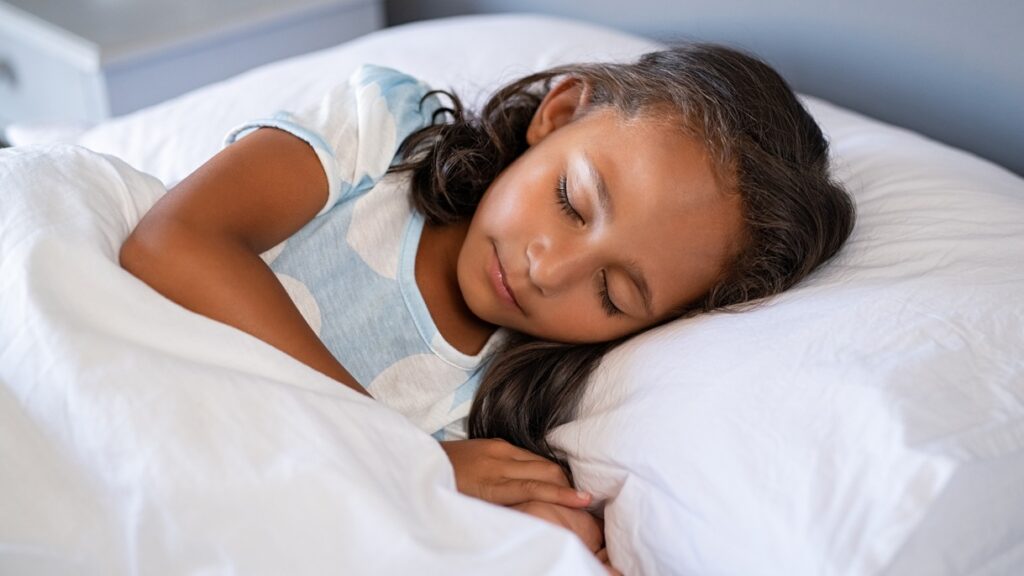
PROVIDENCE, R.I. — A revealing study from Brown University has uncovered that many parents overestimate the amount of sleep their children receive. Despite parental assumptions that bedtime equates to immediate slumber, findings published in Frontiers in Pediatrics suggest otherwise.
The study monitored the sleep habits of 102 elementary school children over a week, employing wrist-worn accelerometers to track various sleep metrics. While 83% of parents believed their children were getting the recommended amount of sleep, only 14% of the children actually met national sleep guidelines. This discrepancy adds to growing concerns about insufficient sleep among American children.
“What parents often don’t see is how long it takes for kids to fall asleep or how often they wake up during the night,” explained Diana S. Grigsby-Toussaint, the study’s senior author and associate professor at the Brown University School of Public Health.
Understanding Children’s Sleep Patterns
To delve deeper into the nighttime routines of children, researchers used accelerometers to capture data on bedtimes, sleep onset latency, nighttime awakenings, and total sleep duration. Parents supplemented this data with surveys and sleep diaries, aiming to compare parental perceptions with actual sleep behavior.
According to the American Academy of Pediatrics, children aged 6 to 12 should sleep between nine and 12 hours nightly. However, the study found that children averaged only eight hours and 20 minutes of sleep. Parents, on the other hand, reported an average of more than nine and a half hours, highlighting a significant perception gap.
Children were awake for an average of more than 38 minutes per night, while parents reported under five minutes of nighttime wakefulness for their children.
Racial and Ethnic Disparities in Sleep
The study also explored racial and ethnic disparities in sleep, an area often overlooked in sleep research. With 56% of participants identifying as Latino, the study found notable differences in sleep duration between Latino and non-Latino children. Latino children averaged just over eight hours of sleep per night, compared to eight and a half hours for non-Latino children. Only 4.4% of Latino children met national sleep guidelines, versus 22.8% of non-Latino children.
Latino caregivers were more likely to express concerns about sleep and report issues with their children staying asleep, whereas non-Latino parents tended to underreport such problems. Both groups, however, generally overestimated the amount of sleep their children were getting.
Grigsby-Toussaint noted that cultural factors such as later bedtimes, co-sleeping, and room sharing, more common in Latino households, might influence both sleep behavior and parental perceptions. The researchers hope future studies will further investigate how home environments and parenting styles impact children’s sleep.
Implications and Recommendations
The findings underscore the need for improved communication about sleep between healthcare providers and families. Grigsby-Toussaint emphasized the importance of addressing the multiple dimensions of sleep to better support children’s health.
Despite the study’s insights, researchers acknowledged the limitations of wrist devices, which might not accurately distinguish between wakeful rest and sleep, potentially leading to overestimations of sleep duration.
To enhance children’s sleep quality, the research team recommended several strategies:
- Establishing consistent bedtime routines
- Maintaining regular sleep and wake schedules, even on weekends
- Encouraging physical activity and exposure to natural light
- Limiting screen time before bed
- Creating a comfortable sleep environment
“This comes down to following those tried-and-true sleep tips to support healthy sleep habits,” Grigsby-Toussaint advised.
The study was supported by the National Institutes of Health, with contributions from Brown-affiliated authors including Aliana Rodriguez Acevedo, Diane Story, Lovisa Werner, David H. Barker, John E. McGeary, and Shira I. Dunsiger.
As the conversation around children’s sleep continues to evolve, this research highlights the critical role of accurate parental awareness and culturally sensitive approaches to improving sleep health.






